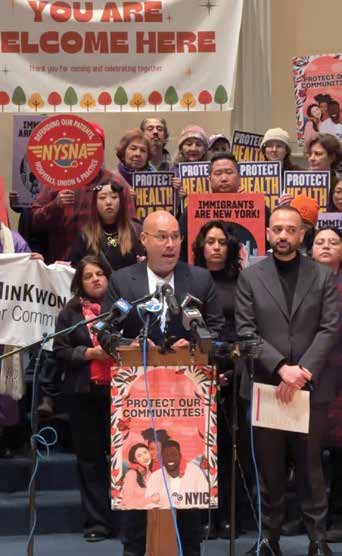Safe Spaces
April 25, 2025
1199 members protest threats to allow ICE enforcement agents inside treatment and clinical areas.

Hugo Roman, an 1199 Delegate and Patient Service Representative at a clinic in midtown Manhattan, said: “I’m here today on behalf of the vulnerable New Yorkers who my colleagues and I provide care for every day. All people, regardless of their immigration status, have the right to receive medical care. And we are outraged that the Trump administration has revoked guidelines that ban immigration sweeps in sensitive areas like healthcare facilities. I’ve worked in Hell’s Kitchen for 15 years, providing quality care to children, adults and seniors. Many of our patients are migrants, especially over the past two years or so. But we treat all patients equally regardless of immigration status or ability to pay.”
He spoke alongside elected officials and community leaders at St. Mark’s Church in-the-Bowery at the rally organized by the New York Immigration Coalition. He was there to protest the devastating new federal directive that strips longstanding protections from immigrant New Yorkers who seek resources in sensitive locations including hospitals, schools and houses of worship
Roman added: “My clinic’s founding principle is healthcare is a right, not a privilege. Everyone from my coworkers to our patients seem on edge since the Trump administration revoked [these] guidelines. We have seen fewer patients coming in and that terrifies us as caretakers.
“Healthcare facilities should be for healing people, not traumatizing patients, especially children and families. I’m here today with other 1199SEIU caregivers to demand that the Trump administration rescind their order and urge NY state and local leaders to protect my patients from ICE.”
Legally, ICE agents must present a valid judicial warrant to enter private spaces including all treatment and clinical areas of emergency departments and hospitals, where entry for anyone who is not a patient should always be monitored and denied by staff if an individual poses any kind of threat to patients or their families.
Judicial warrants are generally difficult to obtain unless someone is suspected of or wanted for a serious offense such as a violent crime or drug trafficking, said Elora Mukherjee, director of the Immigrants’ Rights Clinic at Columbia Law School, told the Gothamist.
1199SEIU has also issued a joint statement with the New York State Nurses Association, denouncing the new federal policy of allowing raids in sensitive locations, including healthcare facilities, warning that the policy dissuades people from seeking necessary care.
“Allowing ICE undue access to hospitals, clinics, nursing homes, and other healthcare institutions is both deeply immoral and contrary to public health,” it says.

